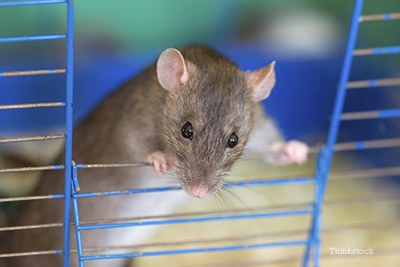
Dr. Laurie Hess lists common household items and toxins that can be dangerous to your exotic pet.
All of us with exotic pets strive to give our pets a safe and comfortable home. But, as we animal lovers know, our pets tend to get into anything and everything, given the opportunity. Here are some important safety tips to help keep our pets out of trouble:
1. Candles – We all love to light those beautiful scented candles, but these should never be burned anywhere near your birds or other exotic pets. The strong scents that these candles emit can be toxic to your pet, especially if you own birds (that are exquisitely sensitive to any kinds of fumes), plus some older candles contain lead in the wicks which also can be harmful if inhaled. The same is true for bowls of fragrant potpourri (that birds or small mammal pets may mistake as a yummy snack). What smells and looks good to you can be quite harmful to your pet. So the take home message is – avoid candles and potpourri around birds and exotics.
2. Many human foods, especially rich chocolate treats in which we all love to indulge from time to time, are toxic for all birds and other exotic pets. In addition, liquor of all kinds can be very dangerous for exotic pets. If you do give your bird a taste of a tasty meal, his or her portion should be kept completely separate from yours. Humans’ mouths contain completely different bacteria from that found in the mouths of birds and other exotic pets; these bacteria can be transmitted from humans to their pets unwittingly in a simple bite of food, leading to severe, potentially life threatening infections. Plus, if you share any food that has bones in it, be careful feeding your bird, in particular, small bones, since they can splinter, causing wounds in the mouth, or get stuck in your pet’s throat and/or stomach.
3. Household decorations, especially those made from natural materials like seeds, dried flowers, and wood, can be tempting for pets to eat, but many of them are treated with potentially toxic chemicals to keep them looking fresh. Plus, once these decorations are chewed on, small parts can sometimes lodge in pets’ intestinal tracts, necessitating a trip to the emergency hospital. Ferrets and rabbits can be particularly intrigued by small objects on the floor, so be sure to keep decorations away from these curious creatures. Also, be sure to keep any enticing decorations out of your pet’s cage, as well. While it might be fun to liven up your pet’s cage with knick-knacks, many shiny objects are tantalizing treats for pets to gobble down or chew on. Be aware; if your pets can reach it, chances are they will eat it.
4. House plants are another potential toxin in homes. Many common plants, including azaleas, daffodils, day and Easter lilies, holly, laurels, pointsettias, and philodendrons - are popular as decorations in our houses, but birds and other exotic pets should be kept far away all of them. Also, many plants also are adorned with ribbons, seeds, and dried fruit interspersed with the greens. All of these things may be seen by your pets as treats. Better to keep pets safe in their cages while these plants are in your home.
5. While it’s great to have friends and family visit, visitors generally bring loud conversation, lots of foot traffic, and many new faces and sounds. Visiting children, in particular, with their quick motions and often boisterous voices, can be particularly intimidating to exotic pets. Plus, sometimes unassuming guests leave doors and windows open out of which birds and other exotic pets are able to make unexpected escapes. Most birds and exotic pets prefer the security of familiarity and may be upset by changes in their routines. Be sure to let your guests know that the birds and other exotic pets should be treated gently, with kindness and respect, and if your pets seem very nervous with lots of activity in the house, let them chill out in another room until all the guests have gone home. This way, you can share your home safely and comfortably with both your guests and your beloved pets.
If you have any questions or concerns, you should always visit or call your veterinarian – they are your best resource to ensure the health and well-being of your pets.
